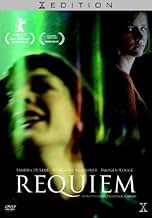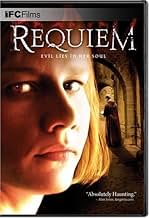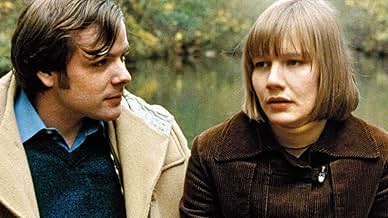VALUTAZIONE IMDb
6,8/10
6625
LA TUA VALUTAZIONE
Aggiungi una trama nella tua linguaA young woman with epilepsy suffers a breakdown during her first year at university, then decides to seek help from a priest in battling the troubles associated with her strict upbringing.A young woman with epilepsy suffers a breakdown during her first year at university, then decides to seek help from a priest in battling the troubles associated with her strict upbringing.A young woman with epilepsy suffers a breakdown during her first year at university, then decides to seek help from a priest in battling the troubles associated with her strict upbringing.
- Premi
- 16 vittorie e 19 candidature totali
Recensioni in evidenza
I've seen both The Exorcism of Emily Rose and this one and found Requiem to be far better and realistic than the other. Emily Rose, in my opinion, was supposed to be commercial Hollywood film. It lulled me to sleep whereas Requiem kept me interested during its entirety. The chief reason for this being the phenomenal performance by the lead actress.
The direction of the film is great as well, since it clearly allows the viewers to form their own decision whether the girl is possessed or schizophrenic. Viewers make their decisions based on which side of the faith they lie. It runs a bit slow but is an excellent psycho-drama devoid of any gratuitous scary scenes.
So overall, in case you like scary stuff, watch Emily Rose; which is not such a great scary movie either. However, if you like psychological dramas and do not wish to watch movies that make you jump out of your seat, watch this one.
The direction of the film is great as well, since it clearly allows the viewers to form their own decision whether the girl is possessed or schizophrenic. Viewers make their decisions based on which side of the faith they lie. It runs a bit slow but is an excellent psycho-drama devoid of any gratuitous scary scenes.
So overall, in case you like scary stuff, watch Emily Rose; which is not such a great scary movie either. However, if you like psychological dramas and do not wish to watch movies that make you jump out of your seat, watch this one.
A sad tale of a young girl's aspirations disastrously ruined by her and her family's inability to separate her religion from her mental illness.
The script is commendably non-judgemental, despite the subject matter, and the the movie's early seventies setting is re-created so convincingly (with muted colours and almost dogme-like camera work) that one might forget that the film was shot only three years ago.
Some may find that the film ends before the story does, but this is merely a refreshing refusal to pander to sensationalism that is completely in keeping with the naturalistic realism of the film as a whole.
The script is commendably non-judgemental, despite the subject matter, and the the movie's early seventies setting is re-created so convincingly (with muted colours and almost dogme-like camera work) that one might forget that the film was shot only three years ago.
Some may find that the film ends before the story does, but this is merely a refreshing refusal to pander to sensationalism that is completely in keeping with the naturalistic realism of the film as a whole.
Just saw the US premiere of the film at the Seattle International Film Festival. I have seen the American version of this story, but this is a far different film with a different goal.
While the US version concentrated on the more sensational parts of the story and the aftermath, this movie is much more interested in the drama of the situation and avoids the 'creeky door' effect of the US version. The filmmaker is very dispassionate about attempting to convince you one way or the other if it was a possession or a woman's psychological breakdown and I find that most appealing. (The US version also tried to ride the fence in a sense, but it was more obvious which "side" it picked as there were many horror movie moments, not present in this version.) The acting was universally GREAT and all actors were so very convincing in their roles. It will be interesting to see how American audiences that venture out to see this version accept it (It will NOT be the hit that "Emily Rose" was here as this will be considered an art film in America and I doubt will be widely released.) Look for it in the US and check it out!
While the US version concentrated on the more sensational parts of the story and the aftermath, this movie is much more interested in the drama of the situation and avoids the 'creeky door' effect of the US version. The filmmaker is very dispassionate about attempting to convince you one way or the other if it was a possession or a woman's psychological breakdown and I find that most appealing. (The US version also tried to ride the fence in a sense, but it was more obvious which "side" it picked as there were many horror movie moments, not present in this version.) The acting was universally GREAT and all actors were so very convincing in their roles. It will be interesting to see how American audiences that venture out to see this version accept it (It will NOT be the hit that "Emily Rose" was here as this will be considered an art film in America and I doubt will be widely released.) Look for it in the US and check it out!
This movie doesn't have a clear message. Instead the title "requiem" really shows what this is about: looking at a person's life in every aspect of it. So the storytelling has to be much more from a distant viewpoint. Some may call this documentary-style as it seems to show a real social case study. Personally it reminded me a little bit of the early Scorseses style of movie-making (e.g. taxi driver): neutral viewpoint, but still subtle messages within, and finally the big clash in the ending, when all strings of the story developed throughout the movie come together.
For me, this is the best way of doing such a movie. First everything feels so normal as you watch the movie. In the end extreme situations begin to develop. Because you know the context, even it is a really extreme situation, it seems to be not at all inexplicable but very real, which it actually was. I could personally feel the helplessness with this situation, because I could not blame anybody in the movie, there was not a side who did anything wrong on purpose. All are just human beings, who are presented perfectly and believable through very good acting. The final shot of the girl's face with background organ music expresses many feelings I have about the movie.
All in all it is a very good movie, but of course it still does not feel as great as some of the best movies of the time. 9 stars
For me, this is the best way of doing such a movie. First everything feels so normal as you watch the movie. In the end extreme situations begin to develop. Because you know the context, even it is a really extreme situation, it seems to be not at all inexplicable but very real, which it actually was. I could personally feel the helplessness with this situation, because I could not blame anybody in the movie, there was not a side who did anything wrong on purpose. All are just human beings, who are presented perfectly and believable through very good acting. The final shot of the girl's face with background organ music expresses many feelings I have about the movie.
All in all it is a very good movie, but of course it still does not feel as great as some of the best movies of the time. 9 stars
Requiem works for many reasons--an intelligent script, understated direction, a somewhat verite camera style--but most of all it works because of Sandra Huller. For all of Michaela's exceptionalism, at no point could I doubt this character. As a recovering Catholic myself, I'm sensitive to the role religion, especially Catholicism, plays in people's lives; and Huller, in my opinion, creates the real thing: implicit faith that needs neither to advertise nor to apologize. Michaela's faith isn't about doctrine or rules but the meaning of life--more specifically, about living the meaning of one's own life, including its less attractive implications. Her faith makes her vulnerable to the devil (or, if you prefer, to her imagination that the devil is messing with her), but her faith also endows her growing suffering (and her eventual death, which she clearly foresees; note her reference to "martyrdom" in one of the last scenes) with an abundance of the same meaning that has sustained her life. She is peaceful at the end ("I must walk my path to the end.") That may be hard for a non-religious person to understand, but to someone raised on stories of the great saints, as Michaela was, it makes perfect sense. It is even something to be grateful for.
Requiem pulls off a bit of cinematic legerdemain in making Michaela a relatively open, non-fanatical, non-prudish woman in spite of the depth of her faith. Her real-life original, Anneliese Michel, wasn't much like that. She was a very conservative Catholic deeply opposed to the liberalization then occurring in the Catholic church after the Vatican Council. Her death and the subsequent trial of her parents and the exorcists forced a kind of confrontation, at least in Germany, between Catholic traditionalism, which has an entirely literal belief in spiritual realities and regards demonic possession and exorcism as established facts, and ecclesiastical modernism, which is embarrassed by such medieval notions and therefore preferred to take the position that Michel was "merely" mentally disturbed. (And if she were, did she suffer any the less? Was her faith any less meaningful to her?) Traditionalists regard Michel, her parents, and the exorcists as martyrs to a modernist church disloyal to its Christian past, and Michel's grave is today a pilgrimage site primarily for conservative Catholics. You'd never guess any of this from Requiem's very sympathetic treatment of her story.
Requiem pulls off a bit of cinematic legerdemain in making Michaela a relatively open, non-fanatical, non-prudish woman in spite of the depth of her faith. Her real-life original, Anneliese Michel, wasn't much like that. She was a very conservative Catholic deeply opposed to the liberalization then occurring in the Catholic church after the Vatican Council. Her death and the subsequent trial of her parents and the exorcists forced a kind of confrontation, at least in Germany, between Catholic traditionalism, which has an entirely literal belief in spiritual realities and regards demonic possession and exorcism as established facts, and ecclesiastical modernism, which is embarrassed by such medieval notions and therefore preferred to take the position that Michel was "merely" mentally disturbed. (And if she were, did she suffer any the less? Was her faith any less meaningful to her?) Traditionalists regard Michel, her parents, and the exorcists as martyrs to a modernist church disloyal to its Christian past, and Michel's grave is today a pilgrimage site primarily for conservative Catholics. You'd never guess any of this from Requiem's very sympathetic treatment of her story.
Lo sapevi?
- QuizSandra Hüller's feature film debut.
- ConnessioniFeatured in The Making of 'Requiem' (2006)
- Colonne sonoreDown 'n' Out
Performed by Light of Darkness
Written by J. Latimer, B. Grant, M. Reoch and M. Bebert
Courtesy of MOP-Musikverlag Hans Sikorski KG
With kind permission of Second Battle Records
I più visti
Accedi per valutare e creare un elenco di titoli salvati per ottenere consigli personalizzati
- How long is Requiem?Powered by Alexa
Dettagli
- Data di uscita
- Paese di origine
- Sito ufficiale
- Lingua
- Celebre anche come
- Réquiem
- Luoghi delle riprese
- Aziende produttrici
- Vedi altri crediti dell’azienda su IMDbPro
Botteghino
- Lordo Stati Uniti e Canada
- 9600 USD
- Fine settimana di apertura Stati Uniti e Canada
- 3309 USD
- 22 ott 2006
- Lordo in tutto il mondo
- 262.460 USD
- Tempo di esecuzione1 ora 33 minuti
- Colore
- Mix di suoni
- Proporzioni
- 2.35 : 1
Contribuisci a questa pagina
Suggerisci una modifica o aggiungi i contenuti mancanti



























